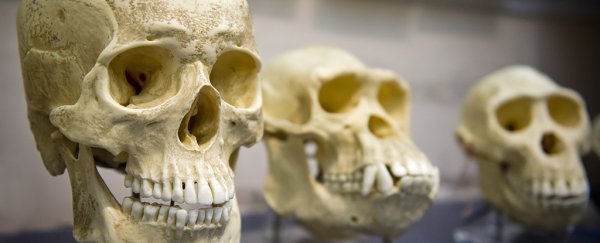The scientific world has accepted the idea of human evolution, the survival of the fittest, and the process of natural selection. But what no one can agree on is whether we're still evolving as a species or not.
One Harvard economist thinks that we are – though more slowly than in the past – and his findings offer an interesting look at how our bodies are continuing to change.
Harvard University's Jonathan Beauchamp looked at data concerning 20,000 people from just one generation in the US. Specifically, he analysed lifetime reproductive success (rLRS) – the passing on of genes from parents to children, and then their children in turn.
All those in the study were born between 1931 and 1953, and had passed child-rearing age by the time the study was conducted. Beauchamp weighed up the number of children each person had, as well as recording other traits linked to genetics, including body mass index (BMI), schizophrenia, menstruation age, and education level.
There were two main findings of note: those with more education had a lower rLRS – which means they had fewer children on average – and there was a slight uptick in the age at which menstruation started (although other evidence says that this is actually going down).
"My results provide additional evidence that humans are still evolving – albeit slowly, especially compared with the rapid changes that have occurred over the past few generations, due to cultural and environmental factors," writes Beauchamp in his paper.
In other words, it could be that humans are generally evolving to become less educated, seeing as fewer educated people are passing on their genes.
There are limitations to the research, as Beauchamp admits. It's a small sample size for this kind of study, covering just one generation, and it doesn't take into account those who may have had children before dying early. What's more, even if evolution is occurring slowly, other factors may be correcting for it, he says.
That said, it's another piece of useful evidence in an increasingly complex puzzle. Is nature perhaps slowly reducing the gene pool of those who spend longer in education?
In any case, you'd be hard-pressed to find a consensus elsewhere on the idea that humans are still evolving.
On the one hand, as contemporary humans we've become advanced enough to control our environment to a large degree: meaning problems like disease, a lack of shelter, or a lack of food – which have always killed off the 'weakest' in the human gene pool – aren't as influential as they were in the past.
On the other hand, modern lifestyle is changing at a faster rate than ever, and there's evidence that human beings are changing with it – becoming more distracted with the rise of the internet and mobile phones, and so on.
Many scientists, including Beauchamp, make a further distinction between cultural evolution – meaning, for example, more of us are spending more time sat at a desk, rather than out in the fields – and biological evolution (which would entail significant changes to our body and brain).
The fact that genetic mutation, genetic drift (the movement of gene variants in a population), and gene flow (the migration of genes between populations) can also trigger evolutionary changes, as well as natural selection, further complicates the issue.
By some definitions, evolution doesn't ever really stop until a species becomes extinct – so it really depends on what you accept evolution to mean in the first place.
It's a point famed naturalist Sir David Attenborough has addressed in the past.
"I think that we've stopped evolving," he told Radio Times in 2013. "Because if natural selection, as proposed by Darwin, is the main mechanism of evolution – there may be other things, but it does look as though that's the case – then we've stopped natural selection."
But Attenborough conceded that, in other kinds of 'evolutionary' contexts, humans were still making significant advances.
"[O]ur evolutionary process is now cultural… Humans have a great cultural inheritance as well as a physical, genetic inheritance – we can inherit a knowledge of computers or television, electronics, aeroplanes, and so on," he added. "Each generation has got all these books that tell them these things, so our cultural evolution is proceeding with extraordinary swiftness."
The study is published in PNAS.
